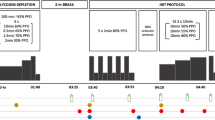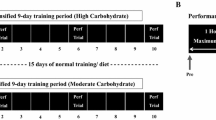Abs tract
The present study evaluated the acute effects of carbohydrate supplementation on heart rate (HR), rate of perceived exertion (RPE), metabolic and hormonal responses during and after sessions of high-intensity intermittent running exercise. Fifteen endurance runners (26 ± 5 years, 64.5 ± 4.9 kg) performed two sessions of intermittent exercise under carbohydrate (CHO) and placebo (PLA) ingestion. The sessions consisted of 12 × 800 m separated by intervals of 1 min 30 s at a mean velocity corresponding to the previously performed 3-km time trial. Both the CHO and PLA sessions were concluded within ∼28 min. Blood glucose was significantly elevated in both sessions (123.9 ± 13.2 mg dl−1 on CHO and 147.2 ± 16.3 mg dl−1 on PLA) and mean blood lactate was significantly higher in the CHO (11.4 ± 4.9 mmol l−1) than in the PLA condition (8.4 ± 5.1 mmol l−1) (P < 0.05). The metabolic stress induced by the exercise model used was confirmed by the elevated HR (∼182 bpm) and RPE (∼18 on the 15-point Borg scale) for both conditions. No significant differences in plasma insulin, cortisol or free fatty acids were observed during exercise between the two trials. During the recovery period, free fatty acid and insulin concentrations were significantly lower in the CHO trial. Supplementation with CHO resulted in higher lactate associated with lipolytic suppression, but did not attenuate the cortisol, RPE or HR responses.






Similar content being viewed by others
References
Achten J, Halson SL, Moseley L, Rayson MP, Casey A, Jeukendrup AE (2004) Higher dietary carbohydrate content during intensified running training results in better maintenance of performance and mood state. J Appl Physiol 96:1331–1340
Angus DJ, Hargreaves M, Dancey J, Febbraio MA (2000) Effect of carbohydrate or carbohydrate plus medium-chain triglyceride ingestion on cyclists time trial performance. J Appl Physiol 88:113–119
Borg GAV (1982) Psychophysical bases of perceived exertion. Med Sci Sports Exerc 14:377–381
Carpentier A, Mittelman SD, Lamarche B, Bergman RN, Giacca A, Lewis GF (1999) Acute enhancement of insulin secretion by FFA in humans is lost with prolonged FFA elevations. Am J Physiol (Endocrinol Metab) 276:E1055–E1066
Davis JM, Jackson DA, Bradwell MS, Queary JL, Lambert CL (1997) Carbohydrate drinks delay fatigue during intermittent, high-intensity cycling in active men and women. Int J Sport Nutr 7:261–273
Davis JM, Welsh RS, De Volve KL, Alderson NA (1999) Effects of branched-chain amino acids and carbohydrate on fatigue during intermittent, high-intensity running. Int J Sport Med 20:309–314
Duclos M, Gouarne C, Bonnemaison D (2003) Acute and chronic effects of exercise on tissue sensitivity to glucocorticoids. J Appl Physiol 94:869–875
Falholt K, Lund B, Falholt TW (1973) An easy calorimetric micromethod for routine determination of free fatty acids in plasma. Clin Chim Acta 45:105–111
Febbraio MA, Chiu A, Angus DJ, Arkinstall MJ, Hawley JA (2000) Effects of carbohydrate ingestion before and during exercise on glucose kinetics and performance. J Appl Physiol 89:2220–2226
Gozal D, Thiriet P, Cottet-Emard JM, Wouassi D, Bitanga E, Geyssant A, Pequignot JM, Sagnol M (1997) Glucose administration before exercise modulates catecholaminergic responses in glycogen-depleted subjects. J Appl Physiol 82:248–256
Grant S, Craig I, Wilson J, Aitchison T (1997) The relationship between 3 km running performance and selected physiological variables. J Sports Sci 15:403–410
Haber EP, Curi R, Carvalho CRO, Carpinelli AR (2001) Secreção da insulina:efeito autócrino da insulina e modulação por ácidos graxos. Arq Bras Endocrinol Metab 45:219–227
Haff GG, Koch AJ, Potteiger JA, Kuphal KE, Magee LM, Green SB, Jakicic JJ (2000) Carbohydrate supplementation attenuates muscle glycogen loss during acute bouts of resistance exercise. Int J Sport Nutr 10:326–339
Hill DW, Rowell AL (1996) Running velocity at VO2max. Med Sci Sports Exerc 28:114–119
Horton TJ, Pagliassotti MJ, Hobbs K, Hill JO (1998) Fuel metabolism in men and women during and after longduration exercise. J Appl Physiol 85:1823–1832
Howlett K, Febbraio M, Hargraves M (1999) Glucose production during strenuous exercise in humans: role of epinephrine. Am J Physiol (Endocrinol Metab) 276:E1130–E1135
Jacobs KA, Sherman WM (1999) The efficacy of carbohydrate supplementation and chronic high-carbohydrate diets for improving endurance performance. Int J Sport Nutr 9:92–115
Jentjens RLPG, Wagenmakers AJM, Jeukendrup AE (2002) Heat stress increases muscle glycogen use but reduces the oxidation of ingested carbohydrates during exercise. J Appl Physiol 92:1562–1572
Jeukendrup AE, Saris WH, Wagenmakers AJM (1998) Fat metabolism during exercise: a review. Int J Sports Med 19:293–302
Jeukendrup AE, Wagenmakers AJM, Stegen JHCH, Gijsen AP, Brouns F, Saris WHM (1999) Carbohydrate ingestion can completely suppress endogenous glucose production during exercise. Am J Physiol Endocrinol Metab 276:E672–E683
Lambert EV, Hawley JA, Goedecke J, Noakes TD, Dennis SC (1997) Nutritional strategies for promoting fat utilization and delaying the onset of fatigue during prolonged exercise. J Sports Sci 15:315–324
MacLaren DPM, Reilly T, Campbell IT, Frayn KN (1994) Hormonal and metabolite responses to glucose and maltodextrin ingestion with or without the addition of guar gum. Int J Sport Med 15:466–470
MacLaren DPM, Reilly T, Campbell IT, Hopkin C (1999) Hormonal and metabolic responses to maintained hyperglycemia during prolonged exercise. J Appl Physiol 87:124–131
Marliss EB, Vranic M (2002) Intense exercise has unique effects on both insulin release and its roles in glucoregulation. Diabetes 51:271S–283S
Marliss EB, Simantirakis E, Miles PD, Purdon C, Gougeon R, Field CJ, Halter JB, Vranic V (1991) Glucoregulatory and hormonal responses to repeated bouts of intense exercise in normal male subjects. J Appl Physiol 71:924–933
Morris JG, Nevill ME, Thompson D, Collie J, Williams C (2003) The influence of a 6.5% carbohydrate–electrolyte solution on performance of prolonged intermittent high-intensity running at 30°C. J Sports Sci 21:371–381
Nassis GP, Williams C, Chisnall P (1998) Effect of a carbohydrate–electrolyte drink on endurance capacity during prolonged intermittent high intensity running. Br J Sports Med 32:248–252
Nielsen JN, Derave W, Kristiansen S, Ralston E, Ploug T, Richter EA (2001) Glucogen synthase localization and activity in rat skeletal muscle is strongly dependent on glycogen content. J Physiol 531:757–769
Regouw BJM, Cornelissen PJHC, Helder RAP, Spijkers JBF, Weeber YMM (1971) Specific determination of free fatty acid in plasma. Clin Chim Acta 31:187–198
Simões HG, Denadai BS, Baldissera V, Hill DW, Campbell CSG (2005) Relationships and significance of lactate minimum, critical velocity, heart rate deflection and 3000 m track-tests for running. J Sports Med Phys Fitness 42:441–451
SPSS Statistical Software Standard version 10.0.1, 1999
Tabata I, Ogita F, Miyachi M, Shibayama H (1991) Effect of low blood glucose on plasma CRF, ACTH and cortisol during prolonged exercise. J Appl Physiol 71:1807–1812
Tanaka H, Monahan KD, Seals DR (2001) Age-predicted maximal heart rate revisited. J Am Coll Cardiol 37:153–156
Tsintzas K, Williams C (1998) Human muscle glycogen metabolism during exercise. Sports Med 25:7–23
Wolfe RR (1998) Metabolic interactions between glucose and fatty acids in human. Am J Clin Nutr 67:519S–526S
Acknowledgments
The authors thank CAPES for the fellowship granted. We are also indebted to the laboratory technician Ivanir Pires for help with the experiments.
Author information
Authors and Affiliations
Corresponding author
Rights and permissions
About this article
Cite this article
de Sousa, M.V., Simões, H.G., Oshiiwa, M. et al. Effects of acute carbohydrate supplementation during sessions of high-intensity intermittent exercise. Eur J Appl Physiol 99, 57–63 (2007). https://doi.org/10.1007/s00421-006-0317-3
Accepted:
Published:
Issue Date:
DOI: https://doi.org/10.1007/s00421-006-0317-3




